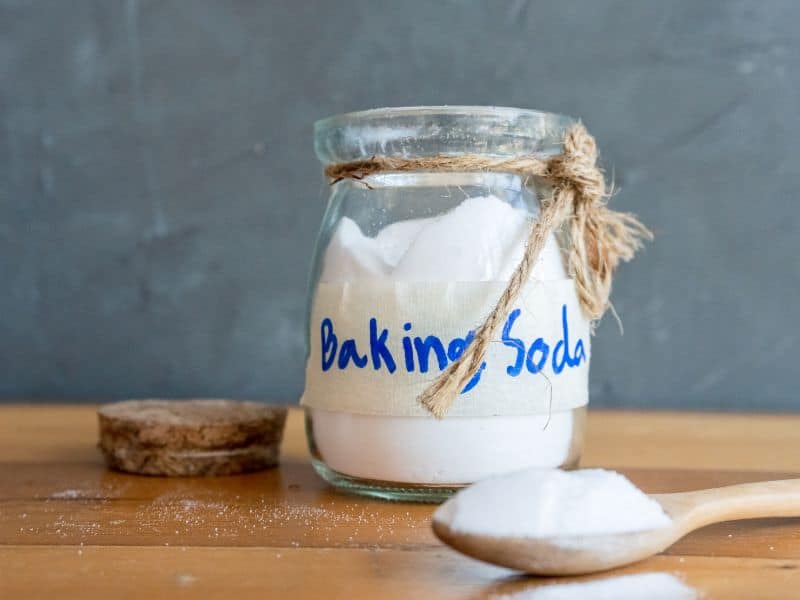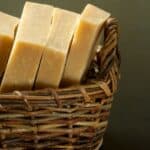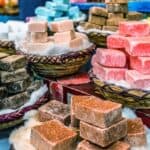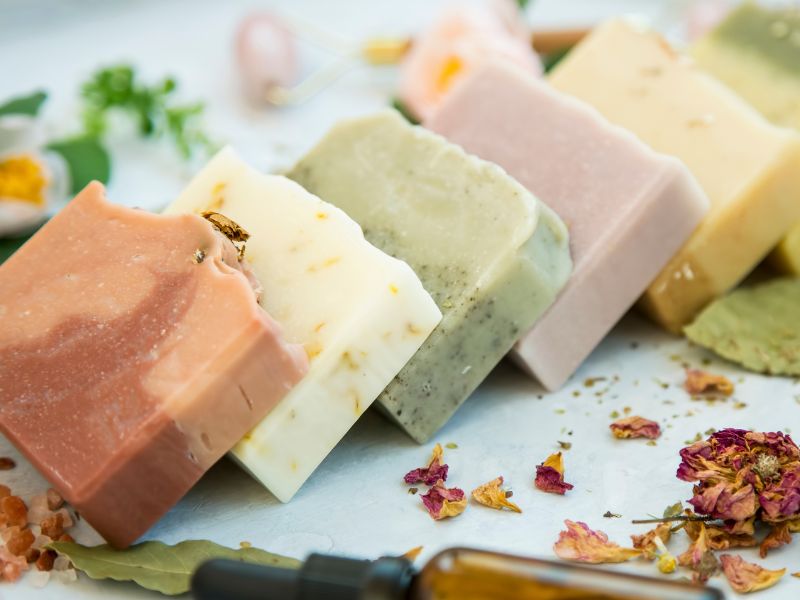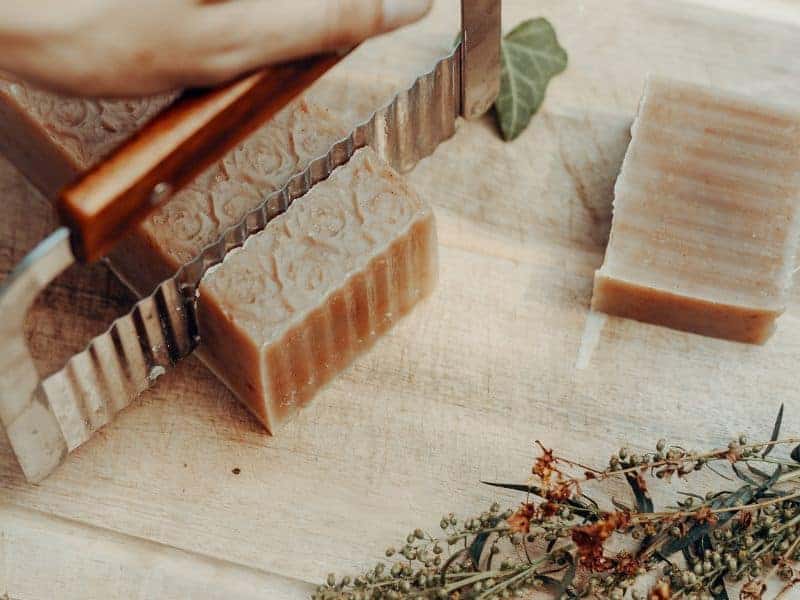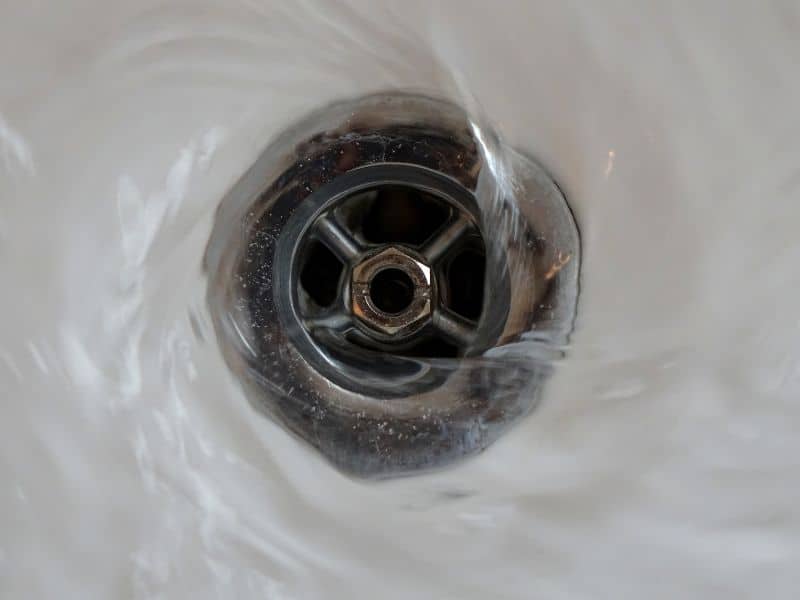One of the ingredients needed to make soap is lye, which can be difficult to find in stores. But what if you could use something else instead? Can you use baking soda instead of lye to make soap?
You cannot use baking soda instead of lye to make soap. Baking soda is not capable of creating the chemical reaction known as saponification and without saponification, you cannot have soap. However, you may be able to use baking soda to create a soft scrub.
Saponification is a process in which oils or fats combine with an alkali such as lye to create soap. When making soap from scratch, you need to use lye because it helps create the reaction that causes the oil and fat molecules to bond together and form soap.
Baking Soda vs Lye For Making Soap
While baking soda is not an alternative to lye in soap making, it cannot be used as a substitute. This is because the chemical reaction that occurs between lye and fats/oils is essential for creating soap, and baking soda cannot create the same reaction to the same effect.
Chemical Reaction Isn’t The Same
When lye is mixed with water and added to oils, a process called saponification occurs. This chemical reaction causes the fatty acids in the oils to combine with the lye, creating soap and glycerin. The resulting mixture is then cured and hardened over time to create a bar of soap.
Baking soda, on the other hand, cannot create this same chemical reaction. While it is true that baking soda is alkaline, it is not strong enough to react with the fats and oils in the same way that lye does. As a result, using baking soda instead of lye will not produce soap.
Additionally, using baking soda instead of lye may result in a caustic, ineffective soap. This is because baking soda is not a strong enough base to fully saponify the oils, which can result in a soap that is soft, oily, and does not lather well. Moreover, baking soda can also cause skin irritation when used in high concentrations, which makes it an unsafe alternative to lye.
What is Lye?
Lye, also known as sodium hydroxide, is a caustic compound that is highly reactive and can cause serious burns if not handled properly. It is used in soap making to initiate a chemical reaction with the oils and fats that produces soap.
When lye is added to water and then mixed with oils and fats, it causes the fatty acids in the oils to break down and combine with the lye, creating soap and glycerin.
Different Types of Lye
- There are two main types of lye used in soap making: sodium hydroxide and potassium hydroxide. Sodium hydroxide is used for making solid bar soap, while potassium hydroxide is used for making liquid soap. Potassium hydroxide is also used for making certain types of soap, such as shaving soap and liquid soap.
What is Baking Soda?
Baking soda, also known as sodium bicarbonate, is a white, powdery substance that is commonly used in cooking and baking. It is also used for cleaning and deodorizing, as well as for personal hygiene products like toothpaste and deodorant.
Baking Soda Doesn’t Stack Up
While both lye and baking soda are alkaline substances that can be used in soap making, there are significant differences between the two.
Lye is a stronger alkaline substance that is necessary for creating soap through the process of saponification.
Baking soda, on the other hand, is not strong enough to create the same chemical reaction and cannot be used as a substitute for lye in soap making.
Risks and Safety Concerns With Using Baking Soda Instead of Lye
It is essential to understand the risks and safety concerns associated with soap making, especially if you plan to use alternative ingredients such as baking soda instead of lye.
Risks of Using Baking Soda Instead of Lye
Baking soda is a weak alkaline substance, whereas lye is a strong alkaline substance that is necessary for soap making. When baking soda is used as a substitute for lye, it can result in a soap that is soft, oily, and does not lather well. Moreover, it can create a soap that is ineffective in cleaning, and it may even pose a risk to your skin’s health.
In addition, baking soda can cause a caustic reaction when mixed with certain oils, which can result in a dangerous situation. Furthermore, using baking soda in soap making can lead to an imprecise measurement of the alkaline substance, resulting in soap that is too acidic or too alkaline. This imbalance can cause skin irritation and other adverse reactions.
Safety Concerns in Soap Making
Regardless of the ingredients used in soap making, it is crucial to follow safety precautions to ensure your safety and the quality of your soap. When working with baking soda or lye, it is vital to wear protective gear, including gloves, goggles, and a face mask. This protective gear will protect your skin and eyes from any splashes or fumes that may cause injury.
Additionally, it is essential to measure all ingredients accurately and mix them thoroughly. Failing to do so can cause uneven distribution of ingredients, resulting in an unsafe or ineffective product. Moreover, always make sure to work in a well-ventilated area and avoid breathing in any fumes that may be harmful.
Tips for Handling Lye When Making Soap
Here are some tips for safely handling lye during soap making:
- Wear protective gear: Before you start working with lye, make sure to wear gloves, long sleeves, and safety goggles to protect your skin and eyes from the chemical.
- Mix lye with water carefully: When mixing lye with water, add the lye to the water slowly and stir the mixture carefully to prevent splashing. It is important to use non-reactive materials such as glass, stainless steel or plastic when mixing lye.
- Work in a well-ventilated area: Lye can release fumes that can be harmful if inhaled, so make sure to work in a well-ventilated area, preferably outdoors.
- Label your lye container: Always clearly label your lye container with the word “LYE” to avoid any confusion with other household products.
- Keep children and pets away: Make sure to keep children and pets away from your workspace when working with lye, and store your supplies in a safe place out of their reach.
- Neutralize spills immediately: In the event of a spill, neutralize the lye immediately with vinegar or citric acid and clean up the spill carefully to avoid skin or eye contact with the lye.
Frequently Asked Questions
When working with lye, it is important to wear gloves, safety goggles, and long sleeves to protect your skin and eyes from the chemical.
While other types of lye, such as potassium hydroxide, can be used for soap making, sodium hydroxide is the most commonly used type of lye for making bar soap.
No, lye cannot be substituted with another ingredient in soap making, as it is necessary for the chemical reaction that creates soap.
To mix lye with water for soap making, slowly add the lye to the water while stirring carefully to prevent splashing. It is important to use non-reactive materials when mixing lye.
No, lye cannot be reused for soap making, as it is used up in the chemical reaction that turns oils and fats into soap.
In the event of a lye spill, neutralize the lye immediately with vinegar or citric acid and clean up the spill carefully to avoid skin or eye contact with the lye.
Conclusion
In conclusion, lye is a stronger alkaline substance that is necessary for soap making, whereas baking soda is not strong enough to create the same chemical reaction and cannot be used as a substitute for lye in soap making.
It is important to understand the risks and safety concerns associated with using baking soda instead of lye and take necessary precautions when working with any type of alkaline substances. With proper safety measures and an understanding of the process, anyone can enjoy making their own custom-made soap at home.

